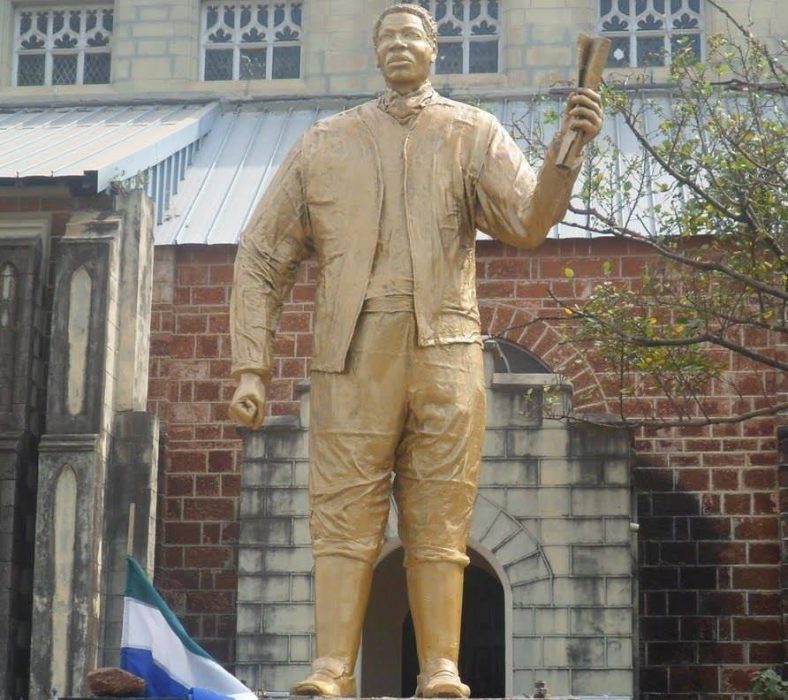In 1999, Thomas Peters, one of the founding fathers of Sierra Leone, was honored by the Sierra Leone government by being included in a movie celebrating the country’s national heroes. A statue of Peters was erected in Freetown in 2011 by the Krio Descendants Union.
Thomas Peters is believed to have been born in Africa and enslaved in America. The earliest documentation of his life is as a 38-year-old bondman in North Carolina. In 1776, when the British offered freedom to bondpeople who fled their rebel (American Patriot) enslavers, Thomas Peters escaped and made his way to New York, where he joined the Black Pioneers Company of the British Regiment of Guides and Pioneers.
The Black Pioneers was the only unit of free Black men that fought during the American Revolutionary War, or American War of Independence, on the British side. The Black Pioneers served as scouts, raiders, and what we would today call military engineers. While serving with the Black Pioneers, Peters became well known and progressed to the rank of sergeant. Wounded twice in battle, he continued to fight against the American Continental forces until the end of the war.
Peter’s military service earned him a certificate of freedom. Therefore, after the Revolutionary War ended the Black Pioneers were among the thousands of Loyalists transported by the British Navy to Nova Scotia in 1783.

However, Thomas Peters and the Black Pioneers were to face disappointment. They formed only a very small proportion of the British Loyalists who left the United States at the end of the war. Over 28,000 loyalists settled in Nova scotia, which at the time was a sparsely settled, underdeveloped colony with wild forests. The European loyalists were given preferential treatment over the three thousand Black loyalists by the British government. They had been promised land but few of them got any. What little was given was thick pine forest which was virtually impossible to clear. Worse than this was the severe winters that would encase the land in a hard unmelting layer of snow for four months of the year. When the British government stopped sending supplies of food to the loyalist and the bondpeople, many Black Pioneers died from hunger.
Among those who did not get the land promised by the British government was Thomas Peters. He waited six months for his claim to be examined. Peters became a representative for the Black Pioneers and drafted many petitions for them. When they were rejected he decided to travel to England to represent them to the Crown.
As Edward Scobie wrote, “This was certainly a courageous decision. For one thing, he was then in his fiftieth year and had no influential friends to back his proposal. What was worse, the government of Nova Scotia quite naturally objected to a complaint of this nature and was against Peter’s trip to England. Thomas Peters faced still graver risks. As a former [enslaved man] traveling alone, he would be at the mercy of any rapacious ship’s captain who might take him to an American port where the British certificate of freedom would be worthless and then sell him. Thomas Peters braved all these perils and arrived in London in 1791.”
In London, Peters met Granville Sharp who had fought successfully on behalf of bondpeople in England. Sharp and Thornton, chairman of the Sierra Leone Company founded in 1791, championed Peter’s cause. The Secretary of State sent a despatch to the governor of Nova scotia about the ill-treatment of Black Pioneers, ordering him to investigate the grievance and put them right. When Peters asked that the Black Pioneers be allowed to join the settlers in Sierra Leone, the British government and the Sierra Leone Company agreed to his proposals, and offered Peters and his colleagues a new promised land in the ‘Province of Freedom’.
Peters went back to Nova Scotia as the representative of the wealthy directors of the Sierra Leone Company who were helping to finance the project. In Nova Scotia, thousands of Black Pioneers applied when the company’s notice appeared. Peters worked closely with John Clarkson, the young naval lieutenant who was in charge of organizing the expedition. By November 1791, Peters had gathered eighty-four emigrants and with his wife and children, sailed to Halifax for ships to take them across to Africa. Eventually on January 15, 1792, 1198 Black Pioneers including Peters and his contingent sailed from Halifax to Sierra Leone. On March 8, they arrived but sixty-five had died at sea.
However, the same problems that confronted the Black Pioneers in Nova Scotia would also confront them in Sierra Leone, which had become a colony administered by a European governor and a European council appointed by the company, whose board of directors in London became the colony’s ultimate ruler. Not surprisingly the Black Pioneers resented the company’s rule. Their grievances included not receiving their land grants as soon as expected; the monopolization of trade by the company; working conditions with the company, the colony’s major employer. In addition, they were required to pay quit rents annually of a shilling an acre to the company, although they had been promised free land before their emigration from Canada. They also disliked the autocracy and racism of the company’s officials. The officials in turn charged them with ingratitude and insubordination!
Again Peters spoke up for the Black Pioneers. He protested the lies and exaggerations made such as the promises of land grants, no taxation on the lands of the first settlers, and most importantly a democratic Black government.
Although he was not personally responsible for the broken promises, the Black Pioneers blamed him for persuading them to come to Africa. Peters subsequently lost much of his influence with them. Shortly after he was accused of theft when trying to collect a debt and convicted by a jury. Soon after his conviction Thomas Peters fell ill and died in Freetown, Sierra Leone on June 25, 1792.
Source:
Black Britannia by Edward Scobie
http://blackloyalist.com/cdc/
http://slaveryandremembrance.org/people/person/?id=PP044
https://www.blackpast.org/global-african-history/thomas-peters-1738-1792/
http://www.biographi.ca/en/bio/peters_thomas_4E.html


